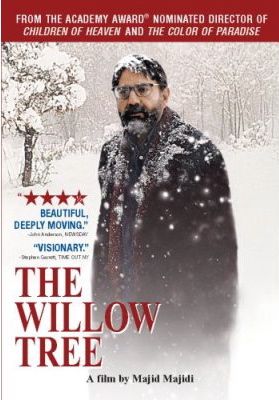| Release List | Reviews | Price Search | Shop | Newsletter | Forum | DVD Giveaways | Blu-Ray/ HD DVD | Advertise |
| Reviews & Columns |
|
Reviews DVD TV on DVD Blu-ray International DVDs Theatrical Reviews by Studio Video Games Features Collector Series DVDs Easter Egg Database Interviews DVD Talk TV DVD Talk Radio Feature Articles Columns Anime Talk DVD Savant HD Talk Horror DVDs Silent DVD
|
DVD Talk Forum |
|
|
| Resources |
|
DVD Price Search Customer Service #'s RCE Info Links |
|
Columns
|
 |
The Willow Tree |

|
The Willow Tree New Yorker 2005 / Color / 1:85 letterbox flat / 96 min. / Beed-e majnoon / Street Date May 20, 2008 / 29.95 Starring Parviz Parastui, Roya Taymourian, Afarin Obeisi, Mohammad Amir Naji, Melika Eslafi, Leila Outadi, Mahmoud Behraznia Cinematography Mahmoud Davudi, Bahram Badakshani, Mohammad Davudi Production Design Behzad Kazzazi Film Editor Hassan Hassandoost Original Music Ahmad Pezhman Produced, Written and Directed by Majid Majidi |
The Willow Tree (Beed-e majnoon) is a sensitive drama from Iranian director Majid Majidi, whose earlier work has won numerous festival awards. 1997's The Children of Heaven garnered an Oscar nomination for Best Foreign Language Film. This 2005 production focuses on the problems of a blind man who regains his sight. Majidi's narrative and characterizations carry the idea only so far but he compensates with lush, evocative visuals.
The best aspect of The Willow Tree is that it puts a human face on the Islamic nation of Iran. Our professor is a middle-aged academic living more or less as a University professor might in any other part of the world. Teheran is a modern city with beautiful neighborhoods, busy expressways and fancy retail stores where big screen televisions are on display. The women wear head coverings but we don't see anybody behaving like a radical. The only hint of militarism is an old picture of a relative in uniform on Youssef's mantle.
The miracle of eyesight is equated with the process of self-enlightenment. Youssef's problem might just as well be a mid-life crisis. Concentrating on the professor's new visions allows director Majidi to construct his film in expressive images. We perceive everything through Youssef's newly healed eyes: relatives crowding a greeters' window at the airport, furnishing in his house, his backyard with its fountain and the flowers his wife grows. Youssef's world has changed completely. Fascinated by reality, he turns away from abstract things. He doesn't want to teach any more and can't face the problems of other blind teachers and pupils. But he's fascinated by a jewelry factory, in which precious metals are cast into decorative shapes. The professor's real problems begin when he loses perspective on his life, and follows the beautiful student Pari (Leila Outadi).

One can tell that The Willow Tree is a mainstream film from a Muslim country by the way it handles the issue of infidelity. Youssef really doesn't have a chance to be unfaithful. No demonstrations of affection are shown between he and his wife Roya; they don't even kiss or hug. Youssef has no contact whatsoever with Pari. He sees her only once or twice, and then from afar. But that's enough of a sin to motivate Roya's taking her daughter and leaving him.
Old American movies about people losing and regaining their sight are usually crude soap operas. Douglas Sirk's handsome but morally vapid Magnificent Obsession is about a playboy who atones for his selfish life by studying to become a top surgeon and restore a woman's eyesight. The Willow Tree also uses the eyesight motif to examine a man's character. As a midlife crisis story, it more closely resembles author Mario Benedetti's oft-filmed La Tregua (The Truce). A middle-aged bachelor has a brief and blissful affair with a young woman, and when it ends he must face his empty life once more. Cultural considerations won't permit Youssef to have an actual affair but his story arc is much the same. When he has lost his family and is brought low, the professor turns to spiritual values for solace.
Majid Majidi's cameramen bring this spiritual dimension to life with their glowing images. The movie appears to have been very handsomely filmed (see below). The fine actor Parviz Parastui expresses Youssef's delight as well as his despair. Majidi's earlier The Color of Paradise deals with blindness as more of a practical problem. A widower wants to remarry and considers his blind son a liability.
New Yorker's DVD of The Willow Tree is a visual disappointment. The video master source is a dark, non-enhanced transfer that appears to crop the sides of the image. Some compositions are very tight on the sides and the main titles are barely on-screen. It's simply not a good transfer that reminds of the mediocre work on some old Fox Lorber tapes and discs. Ahmad Pejman's beautiful score is often singled out for praise, but the disc's audio quality is also nowhere near what we expect to hear these days. Removable English subtitles translate the Farsi dialogue. The transfer has no chapter stops and no real menu, just a card with a button reading, "Play".
On a scale of Excellent, Good, Fair, and Poor,
The Willow Tree rates:
Movie: Excellent
Video: Fair
Sound: Fair
Supplements: none
Packaging: Keep case
Reviewed: May 23, 2008
Reviews on the Savant main site have additional credits information and are more likely to be updated and annotated with reader input and graphics.
Review Staff | About DVD Talk | Newsletter Subscribe | Join DVD Talk Forum
Copyright © MH Sub I, LLC dba Internet Brands. | Privacy Policy | Terms of Use
Subscribe to DVDTalk's Newsletters
|
| Release List | Reviews | Price Search | Shop | SUBSCRIBE | Forum | DVD Giveaways | Blu-Ray/ HD DVD | Advertise |





